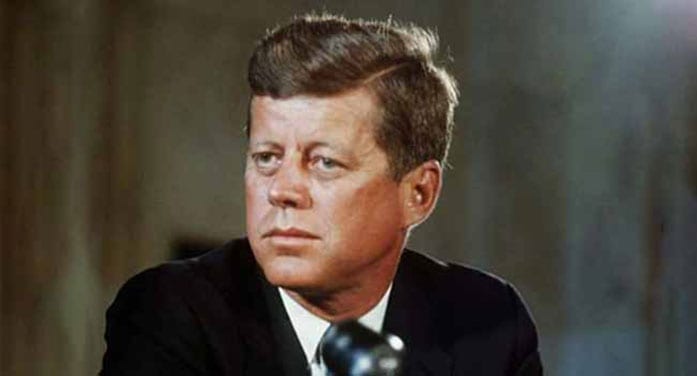 Things were going swimmingly for U.S. President John F. Kennedy immediately following his January 1961 inauguration. Despite being elected by a mere whisker, his approval ratings were stratospheric and much of the media was in love with him. It was as if he was a political superman.
Things were going swimmingly for U.S. President John F. Kennedy immediately following his January 1961 inauguration. Despite being elected by a mere whisker, his approval ratings were stratospheric and much of the media was in love with him. It was as if he was a political superman.
Then came the fiasco at the Bay of Pigs. In his first serious foreign policy test, Kennedy flunked badly. He was in way over his head.
Cuban dictator Fidel Castro had become toxic to both American political parties. He was perceived as a Soviet wedge in the Western Hemisphere and that he was subverting other fragile Latin-American societies.
Kennedy’s 1960 presidential campaign had enthusiastically argued for doing something about it.
In fact, Kennedy’s presidential predecessor, Dwight Eisenhower, had already tasked the CIA with putting a plan together. Having received confidential briefings during the campaign, Kennedy was presented with a fully developed product shortly after assuming office in 1961.
It put him in an uncomfortable spot. As Raul Castro, Fidel’s brother, expressed it years later, “Kennedy vacillated.”
Although a generally sympathetic chronicler of Kennedy’s presidency, Richard Reeves described someone unprepared for the necessary hard choices. Rather than decide to cancel the mission or ensure sufficient resources to guarantee success, Kennedy split the difference. In effect, he chose to reduce political risk at the expense of elevating military risk.
The CIA plan involved training and equipping a small force of Cuban exiles to stage an amphibious landing in southern Cuba. Theoretically, this would spark a general uprising.
Kennedy opted to scale the plan back. The landing location was changed to the less hospitable Bay of Pigs and there was to be no direct involvement or backup provided by U.S. forces. After they hit the beaches, the exiles would be on their own. Above all, there were to be no American fingerprints on the operation.
As conceived, approved and executed, the plan was sorely deficient.
The invading force was way too small. The change of landing location cut off any practical escape route. And there was no element of surprise.
Kennedy had been warned that rumours of an invasion were common currency in Havana and Latin America. The New York Times even published a front-page story indicating something was afoot.
And when Kennedy consulted former diplomat Dean Acheson before approving the plan, Acheson inquired as to the likely balance of forces. He was told there’d be 1,500 exiles up against perhaps 25,000 Castro troops. His riposte: “Well, it doesn’t take Price Waterhouse to figure out that 1,500 Cubans aren’t as good as 25,000.”
But none of this made any difference.
Hitting the beach in the early hours of April 17, 1961, the exiles were promptly outnumbered and outgunned. Kennedy personally denied requests for American air cover and the invaders soon surrendered.
So why did the CIA – with support from U.S. military brass – promote such a plan?
One possibility suggests a classic example of incompetence and groupthink. People say what they think others want to hear and even come to believe it. Nobody wants to be an outlier.
But there’s a more cynical explanation. They told Kennedy what they needed to tell him in order to get his approval, always believing that he’d change his mind and commit American forces once the action commenced. When push came to shove, he wouldn’t – or couldn’t – permit the operation to fail.
The fiasco had implications down the road. It helped precipitate the October 1962 Cuban Missile Crisis.
Increasingly insecure, Castro was determined to ensure there’d be no recurrence. Hence the attraction of placing Soviet missiles in Cuba. That would surely prevent any further invasion attempts.
Soviet leader Nikita Khrushchev also drew a lesson, buttressed by his face-to-face experience at the June 1961 summit meeting in Vienna. Kennedy was “Too intelligent and too weak.” Perhaps a man who approved an invasion and then abandoned his troops could be pushed around.
Kennedy, too, was impacted.
His determination to resist a communist takeover of South Vietnam was strengthened. Consequently, the American commitment that later flowered under his successor was ratcheted up a notch.
And he became skeptical of his intelligence and military experts. They didn’t know nearly as much as they purported to know.
That last bit made him a better president.
Troy Media columnist Pat Murphy casts a history buff’s eye at the goings-on in our world. Never cynical – well perhaps a little bit.
For interview requests, click here.
The views, opinions and positions expressed by columnists and contributors are the authors’ alone. They do not inherently or expressly reflect the views, opinions and/or positions of our publication.


